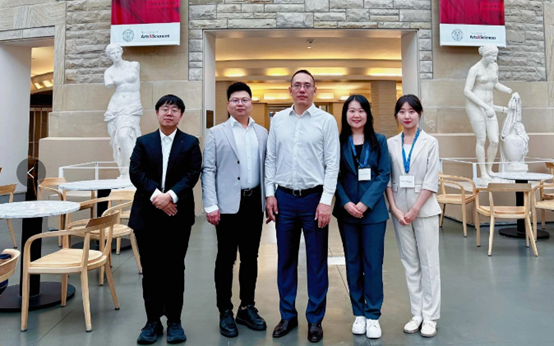 The Forum on Internationalisation Practice of Distance and Open education, part of the China Annual Conference for International Education & Expo (CACIE) sponsored by the Open University of China (OUC) and co-sponsored by the OUC’s Chengdu, Qingdao, and Harbin branches, was held on 22 October 2021 at the Beijing International Convention Centre. CACIE, with the approval of China’s State Council and the strong support of the Ministry of Education (MOE), is an annual event for Chinese and international education hosted by the China Education Association for International Exchange (CEAIE) since 2000.
The Forum on Internationalisation Practice of Distance and Open education, part of the China Annual Conference for International Education & Expo (CACIE) sponsored by the Open University of China (OUC) and co-sponsored by the OUC’s Chengdu, Qingdao, and Harbin branches, was held on 22 October 2021 at the Beijing International Convention Centre. CACIE, with the approval of China’s State Council and the strong support of the Ministry of Education (MOE), is an annual event for Chinese and international education hosted by the China Education Association for International Exchange (CEAIE) since 2000.
In order to fulfil the important mission of becoming an “International Cooperation Platform” entrusted to it by the MOE, the OUC participated in the conference for the first time, aiming to summarise the achievements and experiences of open education in its explorations of internationalisation, gather cross-border wisdom and strength from universities, governments, and enterprises, and collect knowledge for the building of a world-class open university.
The forum’s keynote speeches were hosted by Yu Yougen, deputy secretary-general of CEAIE.


Chen Yinghui, director general of the MOE Department of International Cooperation and Exchanges, attended the forum and delivered a speech on behalf of her department. In her speech, Chen praised the importance of international exchanges and cooperation in the open-university system and its practices and achievements. Talking about the dynamics of open education in recent years, she said that open universities enjoy incomparable advantages in terms of enhancing the communication and coverage of education, noting that a variety of international explorations and positive results have been made by relying on open and flexible educational methods. She pointed out that the Opinions on Promoting the High-Quality Development of Modern Vocational Education issued by the general offices of the CPC Central Committee and the State Council recently clearly proposed “encouraging open universities to build overseas learning centres.” The MOE and other eight departments also issued the Opinions on Further Accelerating and Expanding Opening-up in Education for the New Era. Both of these releases are conducive to promoting the internationalisation practices of open universities. She pledged that the MOE’s Department of International Cooperation and Exchanges will strengthen policy support and help open universities to make new achievements in the pattern of educational opening-up for the new era.
Jing Degang, secretary of the Party Committee and president of the OUC, delivered a keynote speech entitled “The Challenges and Countermeasures of Open Universities in the Post COVID-19 Era.” He said that the arrival of the post COVID-19 era has brought about structural changes in higher education around the world. Open universities should focus on enhancing teaching quality with degree education, external training and elderly education as their major work , and aim to build a major platform for lifelong and online education and a platform for flexible education and international cooperation. They should transform from seeking quantity to strengthening quality, from a focus on qualifications to one on knowledge, from providing degrees to enhancing skills, and from prioritising online teaching to the integrated development of online and offline teaching. At present, it is important for open universities to focus on promoting IT application, digitalisation, smart technology application, systematisation, modernisation, and diversification, and remain committed to being an important force serving lifelong learning for all and a strong support for a technical society.
Fraser Deas, head of Education Services, Culture and Education Section of the British Embassy in China, and Su Si, head of Higher Education, UK Department for International Trade, Education and Skills, gave a joint speech.
Liu Yiqin, chairman of Sichuan Provincial Returned Overseas Chinese Federation; Kevin shakesheff, pro-vice-chancellor, the Open University, UK; Paul Kwan-sing Lam, president, Hong Kong Metropolitan University; Xia Peng, director of the Business, Tourism and Culture Department, Administrative Committee, China-SCO Local Economic and Trade Cooperation Demonstration Area; Zhao Lixia, deputy director of the Education and Training Division, Non-ferrous Metals Industry Talent Centre; Fraser Deas, head of Education Services (China), Culture and Education Section of the British Embassy; Su Si, head of Higher Education, UK Department for International Trade, Education and Skills; and Zhou Feng, chief executive officer of Netease Youdao, attended the forum and delivered speeches. The speakers’ speeches related to the two themes of “Internationalisation Practice in the Open Educational System” and “Global Trends in Distance Education in the Post COVID-19 Era,” analysed practical difficulties, summarised problems, and looked for solutions through interactive discussions.
The OUC’s international explorations are very different from traditional on-campus education. The OUC, by cooperating with national ministries and commissions, large-scale central enterprises, overseas Chinese organisations, and UNESCO, has established Confucius Institutes, Huaqiao Colleges (for overseas Chinese), and overseas learning centres, and made various attempts at internationalisation. The success of the forum is a concentrated display, a beneficial attempt, and a good start for open universities in educational international cooperation and exchanges. It will promote the high-quality development of the internationalisation of open-university. It is hoped that the forum will be used as a platform to enhance the influence of open universities on the global educational stage and advance the construction of world-class open universities.
By OUC International Department